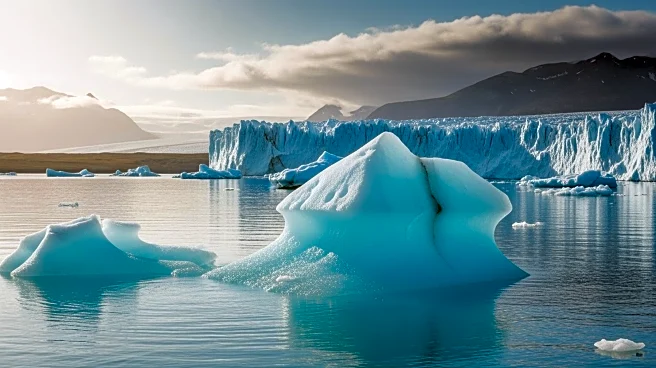What's Happening?
The Icelandic Meteorological Office has raised concerns about the potential collapse of the Gulf Stream, a warm Atlantic current crucial to Iceland's climate. Halldór Björnsson, head of weather and climate at the office,
highlighted a study indicating a 70% chance of the Gulf Stream collapsing due to increasing carbon emissions. This current, which has historically moderated Iceland's climate, is now threatened by greenhouse gas emissions, leading to a slowdown that could significantly impact the country's glaciers. The study suggests that the current levels of carbon emissions already pose a 37% threat to the Gulf Stream's stability. The melting of glaciers, such as the Sólheimajökull, is a visible consequence of these changes, with the glacier's retreat forming new lagoons and altering the landscape.
Why It's Important?
The potential collapse of the Gulf Stream could have profound implications for Iceland's environment and beyond. The Gulf Stream's moderation of Iceland's climate has been a key factor in maintaining the country's glaciers and ice caps. A collapse could accelerate the melting of these ice formations, contributing to global sea level rise and altering ecosystems. The broader impact extends to global climate patterns, as the Gulf Stream plays a critical role in regulating temperatures across the North Atlantic. The findings underscore the urgent need for addressing carbon emissions to mitigate these risks and preserve natural wonders like Iceland's glaciers.
What's Next?
The Icelandic Meteorological Office's findings may prompt further research and international dialogue on climate change mitigation strategies. Policymakers and environmental groups could use this data to advocate for stronger emissions regulations and climate action. The potential collapse of the Gulf Stream may also lead to increased monitoring and research efforts to better understand and predict its impacts. As awareness grows, there may be a push for global cooperation to address the underlying causes of climate change and protect vulnerable regions like Iceland.
Beyond the Headlines
The situation highlights the interconnectedness of global climate systems and the far-reaching effects of human activity. The potential collapse of the Gulf Stream serves as a reminder of the delicate balance within Earth's climate and the cascading effects that can result from disruptions. It also raises ethical questions about the responsibility of industrialized nations to reduce emissions and support vulnerable regions facing the consequences of climate change. The cultural and economic significance of Iceland's glaciers adds another layer of urgency to the conversation, as these natural landmarks are integral to the country's identity and tourism industry.











